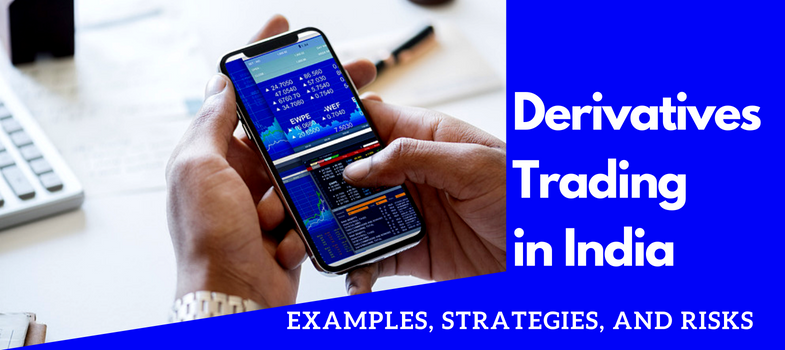Published : July 11, 2018

You can do derivatives trading in India through National stocks Exchange (the NSE), Bombay Stocks Exchange (the BSE) in stocks. Similarly, if your interest is to trade in commodities, MCX and NCDEX are there. The MCX stands for the Multi Commodity Exchange. While NCDEX stands for the National Commodity and Derivatives Exchange. However, if you are willing to trade in currency, you can do it over NSE-SX, MCX-SX. If your interest is to trade in bonds again it’s also possible through NSE platform.
In derivatives trading, you are eligible to trade in derivatives instruments through the above-mentioned platforms. The most common type of derivatives that you can trade in India is future and options or f&o in short. Further, the important underlying markets for stocks, commodities, treasury bills, foreign exchange and real estate.
Before proceeding further let us understand the risks involved in derivatives trading in India.
You should understand that derivatives trading carries an element of risk in it. The following points are self-explanatory.
Suppose you purchased 100 Nifty 50 futures @ Rs. 10724 on May 10. The expiry date is May 28. Your total Investment was INR 10,72,400. You paid the initial margin of INR 1,07,240. On May 28, Nifty 50 index future closes at 10678.
Your loss is (1072400 – 1067800) X 100 = INR 4,60,000. In this situation your entire initial investment (i.e. INR 1,07,240) is lost. Additionally you need to pay INR 3,52,760 (4,60,000 – 1,07,240).
Now suppose you purchased 100 TCS futures @ INR 1740 on May 15. The expiry date is May 28. Your total Investment is INR 1,74,000. You paid an initial margin of INR 17,400. On May 28, the price per shares of TCS was INR 1800.
You gain (1800 – 1740) X 100 = INR 6000.
Suppose you buy 100 Nifty 50 call options at a strike price of INR 10,7000 on May 10. Nifty 50 index was at 10724. Suppose you paid the premium of INR 10,000 (@INR 100 per call X 100 calls). The expiry date of the contract is May 28. On May 28, the Nifty index closes at 10678. The call expires worthless.
You possess the entire INR 10,000 paid as premium.
Let us not assume that you buy 100 TCS put options at a strike price of INR 1750 on May 10. TCS share price is at 1740. You paid the premium of INR 5,000 (@ INR 50 per put X 100 calls). The expiry date of the contract is May 2018. On May 28, TCS shares close at INR 1800. In this case, the put option will expire worthlessly.
You will lose the entire INR 5,000 paid as premium.
Future contracts are similar to the forward contracts with some improvements. Forward contract derives the values from the underlying spot prices. Under these contracts, two parties enter into an agreement to trade at some point in future. They agree to trade at pre-specified price and time. Also, there is no exchange of money during the time of entering the agreement. Future and forward contracts are derivatives market instruments in India.
However, trading with the forward contracts have deep limitations like –
Future contracts, however, overcome all these forward contract limitations. All future contracts are standardized. Trading in the future contract is centralized. Stocks exchanges facilitate centralized trading mechanism in this derivatives instrument. Further, there is no counterparty risk involved with future contracts. There is always clearing corporations behind every side of a transaction.
At present, there are five clearing corporations operational in India, namely –
The other features that differentiate future from the forward contracts are –
There are various participants in the derivatives trading in India. Learn about the derivatives market participants such as hedgers, arbitrageurs, and speculators in the blog.
In order to understand instruments for the derivatives market, let us concentrate over NSE platform. Mainly two types of derivatives instruments, namely futures and options.
All future contracts have cash settlement over NSE. Any future contract is always made between two persons. But clear corporation always takes opposite position against any order. Thus, there is always an opposite party by default in each trade. Unlike forward contracts, in future contract money transfer takes place during the time of entering the contract.
Similarly, while entering an option contract, the buyer of an option pays the premium. With this payment, the buyer gets the right to exercise his option to buy at the expiration date. On the other hand, the seller of options receives the premium. Due to this he/she is obliged to sell/buy the asset in the situation when buyer exercises his right.
In general, options are of two types. call options and put options. All options at NSE also settle at cash. When you buy a call option, you receive the right but not obligation to buy the asset at predefined price and quantity at or on the future date. On the other hand, if you buy put options you get the right but not obligation to sell the asset at predefined price and quantity at or on the future date.
Similarly, you can also write options. When you sell a call or put options we call it as writing options. One thing you must remember that while writing an option you receive the premium and when you buy options you will need to pay the premium. Get yourself acquainted with equity derivatives trading strategies for NSE with Rmoney India market intelligence.
NSE has various derivatives product for the underlying stocks. You can trade on the future and options of both indices and single stocks. You can trade in Nifty 50 future, CNX IT Index, Bank Nifty index, CNX Nifty Junior Index, and Nifty Midcap 50 index.
But you can trade only on long-dated options contract on Nifty 50. You can also have the option to trade in some features of individual stocks and their options. Regarding options, you must remember, that all options on individual stocks are American type of options. While all index-based options are European options. Under American option, you can exercise your right any time up to the expiration date. While under European option you can exercise your right only on the expiration date.
You can learn more about types of derivatives trading in India on one of my blog. In this blog, you will not only know the various types of derivatives instruments will come to know various sources where you can look for information on derivatives trading in India.

Enjoy flexible trading limits at
lowest brokerage rates ?
Open Your Investments Account Now
0Account Opening Charges
Life Time Demat AMC
Brokerage







Ensure the security of your investments by updating your nominee details in your trading & demat account online. It’s quick and hassle-free!
📌 Act Now to Stay Compliant
For assistance, contact our Customer Care at 0562‑4266666 and email askus@rmoneyindia.com.

IT'S TIME TO HAVE SOME FUN!
Your family deserves this time more than we do.
Share happiness with your family today & come back soon. We will be right here.
Investment to ek bahana hai,
humein to khushiyon ko badhana hai.
E-mail
askus@rmoneyindia.com
Customer Care
+91-9568654321